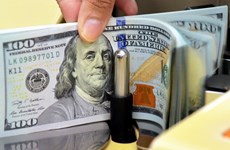Hanoi bond market enters adolescence
Since separate bond trading systems officially began operations on the
Hanoi Stock Exchange in September 2009, the market has grown to a
listing of 500 bond codes with a value of 223.3 trillion VND (10.6
billion USD) – equivalent to about 12 percent of the national GDP,
according to the exchange.
Since separate bond trading systems officially began operations on the
Hanoi Stock Exchange in September 2009, the market has grown to a
listing of 500 bond codes with a value of 223.3 trillion VND (10.6
billion USD) – equivalent to about 12 percent of the national GDP,
according to the exchange.
Government bonds account for about 75 percent of the total market value.
The members of the bond exchange now include 25 securities companies, 16 domestic banks and four foreign-invested banks, with the few foreign players accounting for up to a fifth of the total average trading value.
The bond exchange allowed transfers more directly without paying brokerage fees for brokers as well as controlled risks, with bonds being deposited at the depository centre rather than at a brokerage, said the deputy director of the Military Bank's capital department, Luu Tien Cuong.
High yields had a negative impact on the growth of the bond market last year, according to an analysis from the Bank for Investment and Development of Vietnam (BIDV).
"This has resulted in the ineffectiveness of bond auctions and low market liquidity in 2010," said a senior official who asked to remain anonymous.
To improve the situation, the State Treasury, the Hanoi Stock Exchange and the Vietnam Securities Depository last week signed agreements enabling them to jointly conduct auctions, and register, list, deposit and pay for Government bonds. Under the new system, the Treasury will also give the exchange early notice of capital mobilisation plans and release quarterly and annual reports.
Under the agreement, these bodies will also co-ordinate to shorten the duration for trading newly-issued bonds from 10-14 days to six days after the initial bond auction.
Tran Van Dung, director of the Hanoi exchange, said the exchange would also restructure the way bonds are listed by matching bond codes with the same duration and interest rates, making it easier for investors to trade./.
Government bonds account for about 75 percent of the total market value.
The members of the bond exchange now include 25 securities companies, 16 domestic banks and four foreign-invested banks, with the few foreign players accounting for up to a fifth of the total average trading value.
The bond exchange allowed transfers more directly without paying brokerage fees for brokers as well as controlled risks, with bonds being deposited at the depository centre rather than at a brokerage, said the deputy director of the Military Bank's capital department, Luu Tien Cuong.
High yields had a negative impact on the growth of the bond market last year, according to an analysis from the Bank for Investment and Development of Vietnam (BIDV).
"This has resulted in the ineffectiveness of bond auctions and low market liquidity in 2010," said a senior official who asked to remain anonymous.
To improve the situation, the State Treasury, the Hanoi Stock Exchange and the Vietnam Securities Depository last week signed agreements enabling them to jointly conduct auctions, and register, list, deposit and pay for Government bonds. Under the new system, the Treasury will also give the exchange early notice of capital mobilisation plans and release quarterly and annual reports.
Under the agreement, these bodies will also co-ordinate to shorten the duration for trading newly-issued bonds from 10-14 days to six days after the initial bond auction.
Tran Van Dung, director of the Hanoi exchange, said the exchange would also restructure the way bonds are listed by matching bond codes with the same duration and interest rates, making it easier for investors to trade./.













